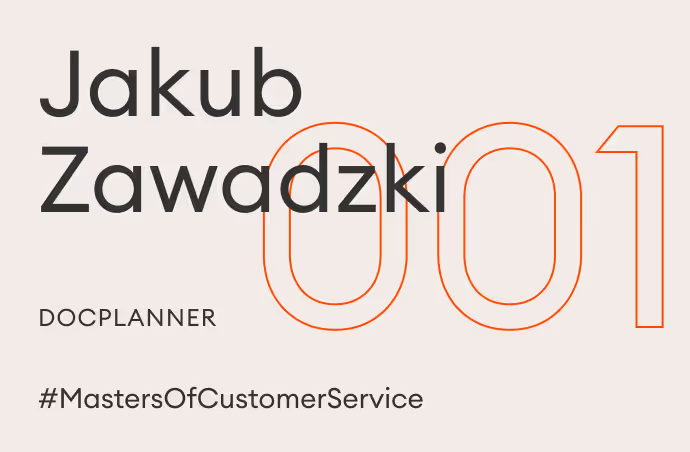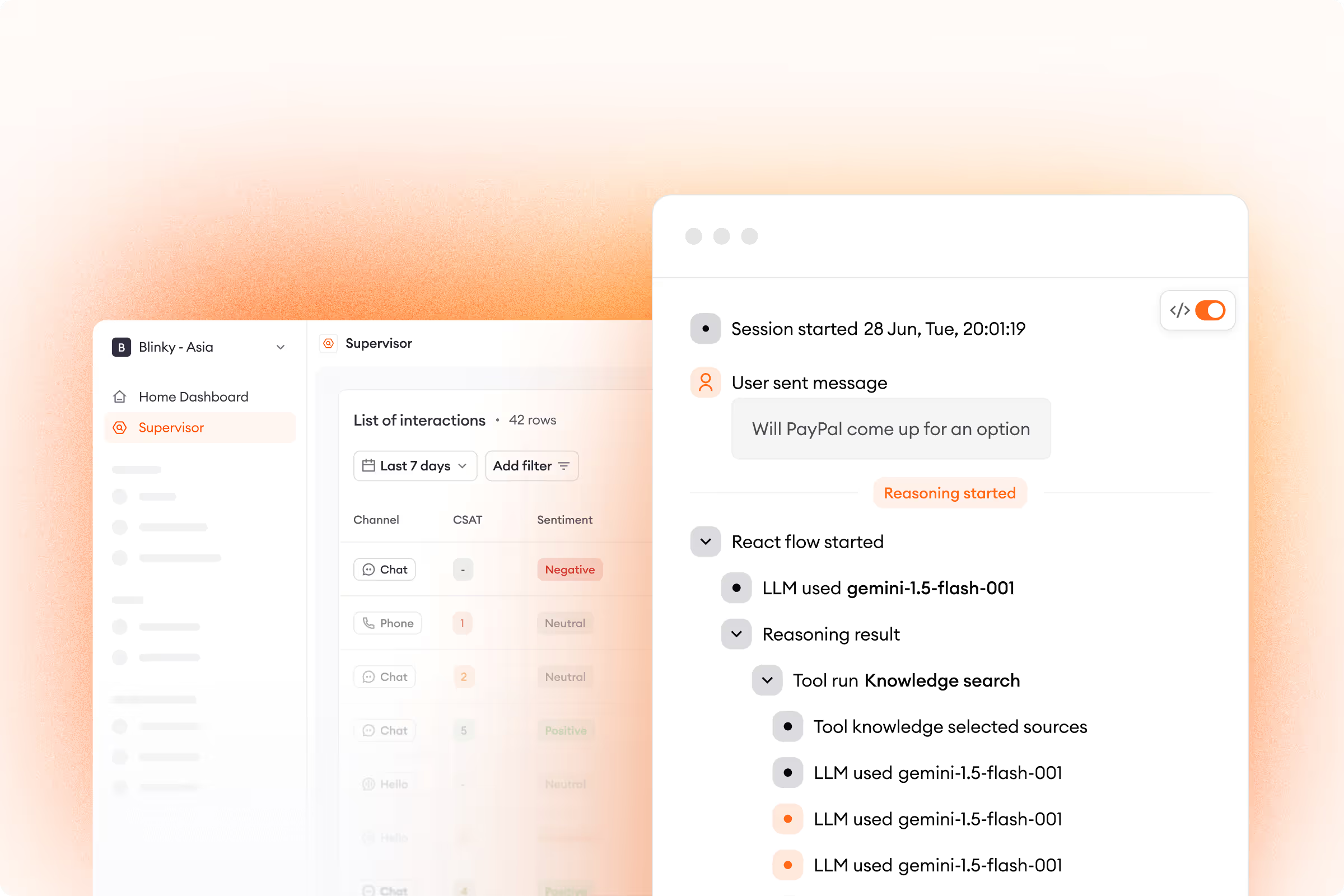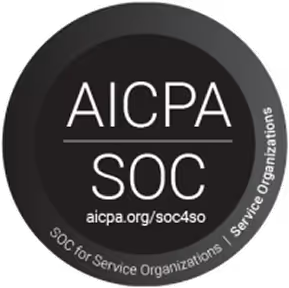They say the best way to get flawless at things is by learning from your own mistakes. We believe that it’s better to avoid failures and double down on patterns that work. If you would just have this magic knowledge...
Therefore, it is our pleasure to introduce you to our new series: Masters of Customer Service. Its goal is simple: to learn from the best industry experts, as well as their experience, successes and failures. Get to know the tools they use, patterns they follow, and the mission they have.
Let's meet our first Master – Jakub Zawadzki, Head of Customer Success Poland at DocPlanner.

Jakub is an experienced manager who oriented his career on customer care, support and customer success. He is a Spanish philology graduate, an interpreter and a cybersecurity engineer. Currently in DocPlanner – ZnanyLekarz.pl – a Polish start-up that made its way to 12 international markets, servicing over 70 thousand customers and 35 million patients worldwide.
Check out more interviews in our Masters of Customer Service series! Like our talk with Mariana Koudela: Masters of Customer Service #3: Mariana Koudela, Perlego
How did you make your way into the world of customer support?
I started my career about 10 years ago. It was in Call CenterPoland, which was pure coincidence. I was studying at the time, and they were looking for people who would be able to sell mortgages to British people over the phone. So I submitted my CV and started my role with sales and telemarketing, but it was still related to customer support. I worked there for about a year as a telemarketer, then I became a team leader for a brief moment, and then I was promoted to account manager. It was in the same company. After that, I worked in several call centers where I took care of sales, finally I started managing my own teams. It was from there I made my way to the world of customer support for bigger companies. In one of them, we were handling orders from the Internet and trying to make the best of them by confirming the orders and then trying to increase the overall price of the orders. After about 6 years of selling pretty much everything on the Internet and also running the customer support part of it, I made my way to DocPlanner. It was about 2 years ago.
That sounds great! How many people are there in your customer support team?
Right now, our customer support team is made up of 9 people for individual medical specialists, but we also have a second team which is dedicated to medical facilities, where the customer support is mixed with customer success. So they do both. Overall it’s going to be 16 people.
With which type of customer do you meet most often? People from huge corporations, medium-sized businesses or maybe small startups?
We mainly work with individual doctors who are running their own business and small/medium-sized businesses.
How do you measure customer satisfaction? What are the pros and cons of your approaches?
Yes, we measure it using two indicators: NPS and CSAT. The NPS for me is more about the product-related indicator, but it doesn’t work well in Poland. It’s not the main priority for us right now for customer support. We contact each doctor that provides us with insights into whether it’s positive or negative. It works similarly with CSAT. The main problem which we’ve got with this indicator is that it’s not integrated with phone calls, we only use it with emails. Every 6-months or so doctors receive a message with a request to rate the level of satisfaction after handling their inquiry.
What tools do you use in your daily work?
We use a calling app that we have from Focus Telecom. They have integrated their software with Hubspot, which is our main tool in daily work. We use Focus CC to call our customers. It provides us with more detailed statistics. We use our dedicated CRM, which was built by our team, and Officevibe, which is important for me because it shows me the level of morale in the customer support team. To communicate, we use Zoom and Slack.
How do you start your work every day? Do you have any morning routine?
I usually start by going through the Slack, because we also have some important things there. Then I go through my emails, and lastly, I go through all reports.
Do you have a lot of meetings and calls during the day?
On a daily basis–definitely yes. I would say that since we are working remotely, I have 5/6 calls every day, they can last up to 45 minutes.
How do you deal with stress and overwork?
Fortunately, I don’t have a big problem with that. I tend to switch off Slack notifications after 6 pm. I have got a great team, and I can really count on them. When it comes to overwork–it’s the thing which I overcome by going to the gym, reading and playing video games.
In your opinion, what features should an excellent customer service representative have? What skills would make this person stand out from the crowd? Why are these skills so important?
For me, it’s going to be soft skills. Right now, I prefer to hire a person who doesn’t have any experience but represents more desired soft skills. Mainly I am referring to being customer-centric. They need to have this sort of philosophy of putting the customer first, and it’s incredible how easily you can spot that ability during the interviews. You see if they are passionate about customer support or not. The most valuable people for me are people who take ownership of everything they do, and they have this need for helping people. If they don’t have skills which they need for example they are not very fast, or they need some time to learn new stuff–it’s not a problem. If they have these soft skills, it’s easy to teach them everything.
"The most valuable people for me are people who take ownership of everything they do, and they have this need for helping people"
From the hard skills, I would say that they have to be very communicative. Some technical skills, like installing new tools or apps would be a huge plus for them, because it’s going to be easier for them to start. We need people who are technologically oriented. Those are the four essential things for me:
- they have to be helpful;
- they have to like people;
- they need to be communicative;
- they need to be a little bit tech savvy.
Are there any books or maybe a podcast which you’d recommend? If yes, then why?
There is an excellent book which is called “How to Win Friends and Influence People”, and I would recommend this one. I’m currently focused on managerial skills, so it’s easier for me to recommend something from this area than from typical customer support. I would also say that some books aren't relevant because when I compare customer support which we have now to the customer support which was around 10 years ago - it’s a different world. Books are becoming outdated, really fast.
How will—in your opinion—customer support look like in five years?
I was actually thinking about that, and to be honest with you–I don’t really know exactly. From my perspective–we need to make the best of what we get from technology. We need to make customer support as automated as possible. For example, some companies use something called robocalls. It’s kind of a pre-recorded sales pitch, and people don’t have to do it manually. Some of these bots are good, but I wouldn’t say that they are indistinguishable because you know that you are talking to robots, but still, the experience is pretty good. First of all–everything’s going to be done a little bit more automatically, but we still need to make sure that we keep track of the customer experience. We can’t just lose our minds over technology. We still need to make sure that the customer is the first priority even if we have the best technologies. We need to make sure that people who use these solutions are still as satisfied as they would be if the real person actually was servicing them.
"We still need to make sure that the customer is the first priority even if we have the best technologies."
If you could hire a celebrity/a public person to your customer service team, then who would that be and why?
Hmm, for me that would be Neil deGrasse Tyson, because that type of a guy can explain science in a way that people want to listen to. Docplanner is very technologically-oriented, and sometimes we struggle with explaining some of our ideas. Neil deGrasse Tyson has got the skills, the voice and he knows how to present–plus he is a scientist, and I really like him :)!
Do you remember any funny moments from your career in customer service?
Yes! We sent an NPS survey to our customers in Poland. There was one question: “Would you recommend us to your friend or a family member?”. The scale was from 0 to 10 (0 - I won’t recommend you, 10 - I will recommend). We’ve been receiving a lot of negatives like 0/1 and also a lot of 5 which is in the middle. It wasn’t the best result compared to other regions where we provide our services. So we started a bit of detective work. I asked our customer support staff to give the people a call and ask them: “Sir or Madam, why did you rate us a 0?”. And it was something that we couldn’t even imagine, but when they told us it became so clear. They told us: “You were asking me if I would recommend your product to my friend, but I don’t talk with my friends about things like that, but I’m very happy with it!”. That was like 65% of the negative NPS that we were receiving. People who marked us a 5 told us that they also don’t talk with relatives about our services, and they don’t pay much attention to that, so they’ve marked us 5.
Do you have any specific goal for this year? If yes, then what is it?
My goal for this year is to make the customer support in DocPlanner a little bit more automatic. My main inspiration was when I was talking with Maciek from Zowie. We were discussing implementing their chatbot, but we’ve decided to postpone it a little bit. I’ve figured out that we could have a great chatbot, but our infrastructure is not ready yet. Customers' inquiries would be directed to an empty knowledge base, so the customer experience wouldn’t be that great. We’ve started from the beginning, and we are building a new knowledge base (which is going to be great), and rebuilding our premium zone for customers and making it look like it was made in the 21st century by people who actually know what customer experience is.
On top of that, we plan on making the inquiries that we are mentioning right now a little bit more automatic and this requires a little bit more than building just a base knowledge and beautiful environment. We need more understanding about why people contact us and what are the main topics of the conversations.
Want to hear from more experts? Check out our talk with Alicja Heyduk: Masters of Customer Service #2: Alicja Heyduk, Infermedica
.avif)

.avif)
.svg)







